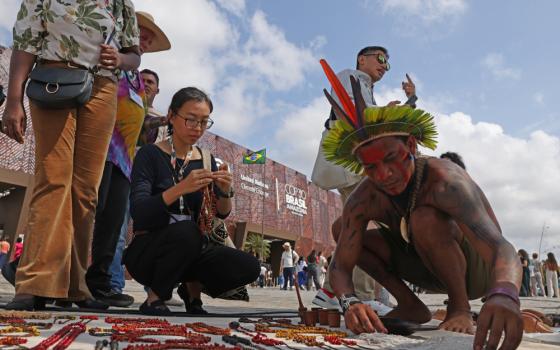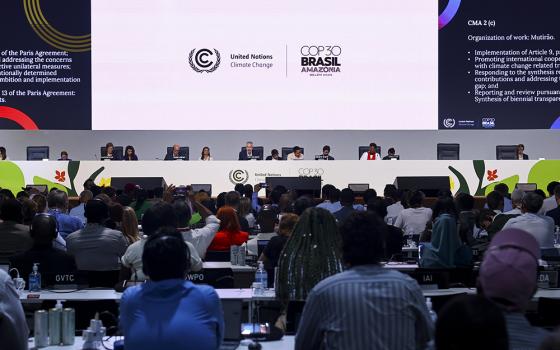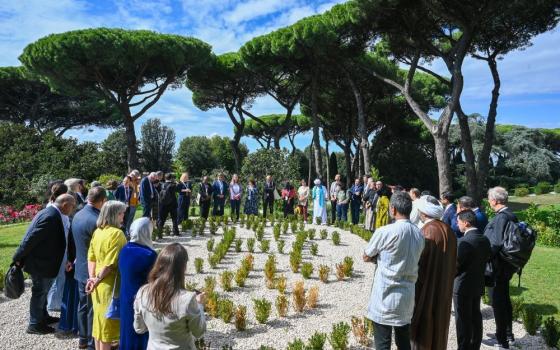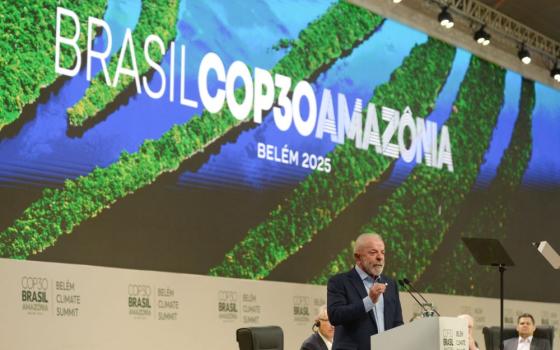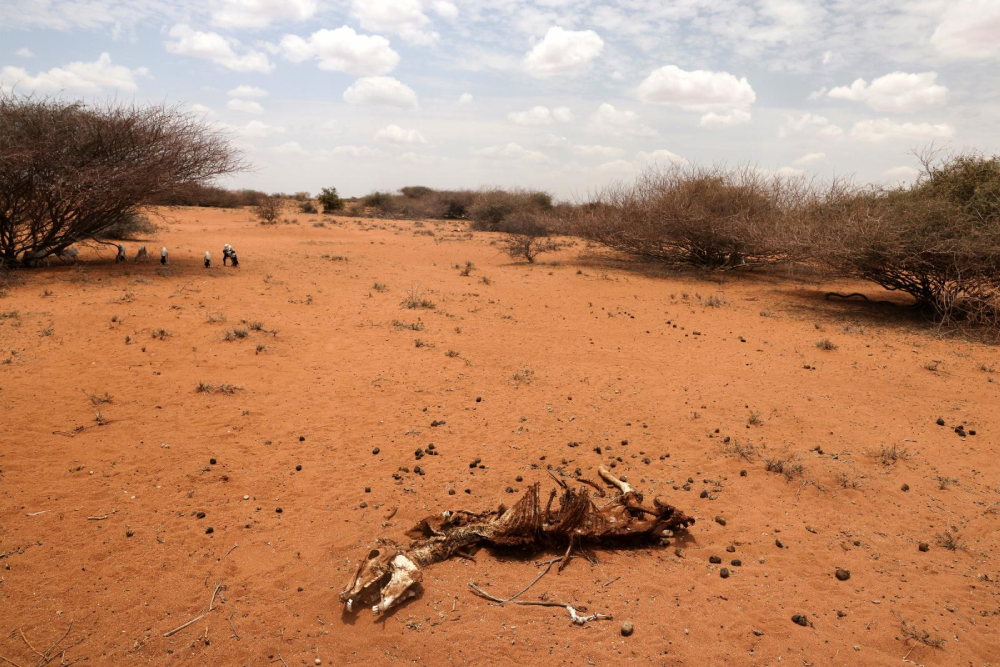
The carcass of a donkey lies on the dried-up ground near the town of Kargi, Kenya, Oct. 9, 2021. (CNS/Reuters/Baz Ratner)
The last of the evening light is fading over this arid northern county when Maria Lokito bends down to check the small plastic rain bucket outside her mud-walled hut. The bucket is empty. It has been empty for weeks.
"When the rain comes, we plant," she says quietly, brushing the red dust from her palms. "But the rains have become strangers now. We pray, we wait and sometimes, they never come."
Lokito, a mother of five, lives within the Catholic Diocese of Lodwar in Turkana, northern Kenya, a region that has endured decades of rising temperatures, erratic rainfall and deepening drought. Her story of waiting, hoping and planting in vain is part of a much larger global story, one world leaders will once again promise to address over the coming days.
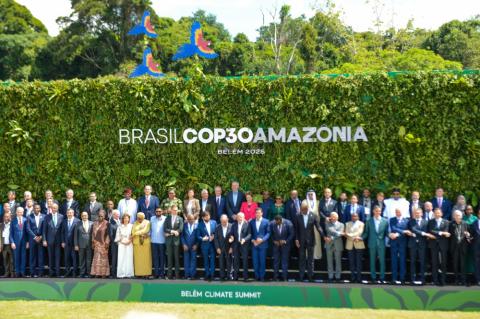
Cardinal Pietro Parolin, far right on the bottom row, joins world leaders for a group photo Nov. 7, 2025, during COP30, the U.N. Climate Change Conference, in Belem, Brazil. (CNS/COP30/Antonio Scorza)
From Nov. 10-21, world leaders will be gathered in Belém, Brazil, for COP30, the 30th United Nations Climate Change Conference. It is being held in the shadow of the Amazon rainforest, one of Earth's most critical carbon sinks, now under mounting threat from deforestation, fires and extractive industries. The summit is billed as a "crucial moment" to accelerate climate action, but for people like Lokito in Turkana, Kenya, such language feels achingly familiar. It has echoed through three decades of climate diplomacy.
"This is not the first time a COP is called a turning point," said climate activist and negotiator Jackline Wanjiku from Kenya. "But for 30 years, they've said the same thing. Meanwhile, the Amazon burns, and people like Lokito suffer."
The Rev. Fletcher Harper, an Episcopal priest and executive director of GreenFaith, called the COP legacy "part blessing, mostly heartbreak."
"The Paris Agreement was a breakthrough," he said, "but progress since then has been like pulling teeth. Wealthy, high-emitting nations have made lofty promises, only to stall or retreat when it mattered. Behind it all is the iron grip of the fossil-fuel industry on government decision-making. It's a damn shame and a moral failure that history won't forgive."
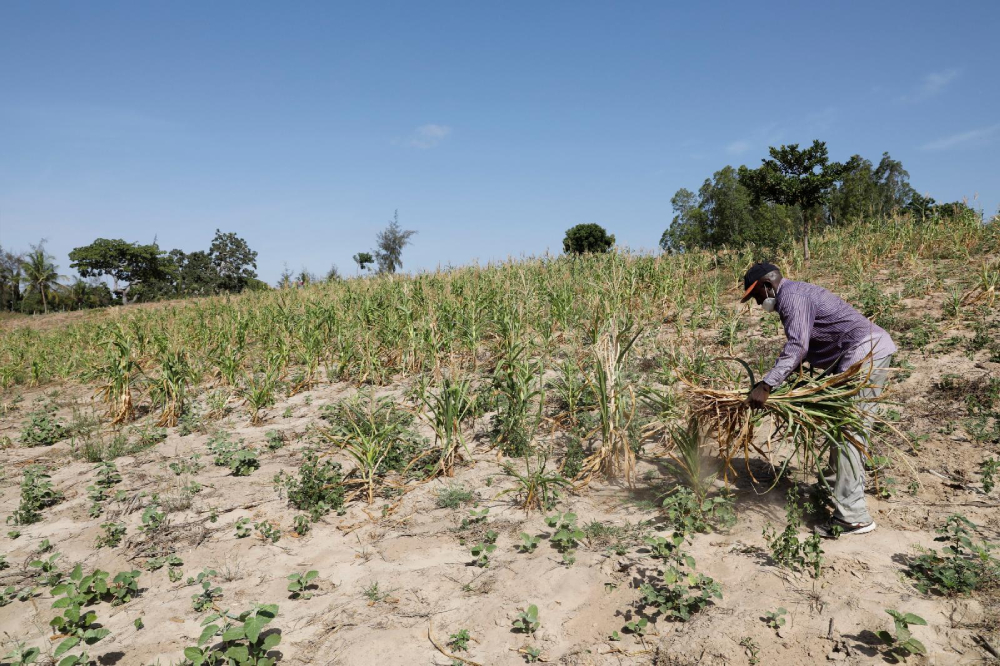
Kenyan farmer Bernard Mbithi uproots a field where he was growing corn that failed because of a drought in Kilifi, Feb. 16, 2022. (CNS/Reuters/Baz Ratner)
When the first COP opened in Berlin in 1995, world leaders pledged to cut greenhouse-gas emissions and avert dangerous warming. Thirty years later, global temperatures have climbed more than 1.2 degrees Celsius, and annual emissions have ballooned to over 37 billion tons. The Kyoto Protocol promised binding cuts that never materialized. Copenhagen, despite unprecedented global attention, witnessed negotiations collapse without a new deal. Paris set ambitious goals, yet fossil fuel subsidies have since skyrocketed. At COP28, more than 2,400 fossil fuel lobbyists outnumbered delegates from the world's least developed countries.
Despite decades of lofty declarations, the planet's most vulnerable communities — those least responsible for the crisis — are the ones left to bear the weight of failure.
Faith on the frontline
To ease these mounting pressures, the Diocese of Lodwar has partnered with Caritas Finland to promote climate-smart farming, introducing drip irrigation and drought-resistant crops to help families adapt.
"The legacy of the COP process is both progress and paralysis," said Fr. Iyo Iyan Daquin, the Justice, Peace and Integrity of Creation coordinator for the Oblate Mission in Kenya. "It has placed climate justice on the global agenda and created tools such as Loss and Damage. Yet emissions keep rising and the poorest still bear the heaviest cost. From Kyoto to Copenhagen, from Paris to Glasgow, each milestone reminds us that promises without transformation risk becoming monuments of delay."
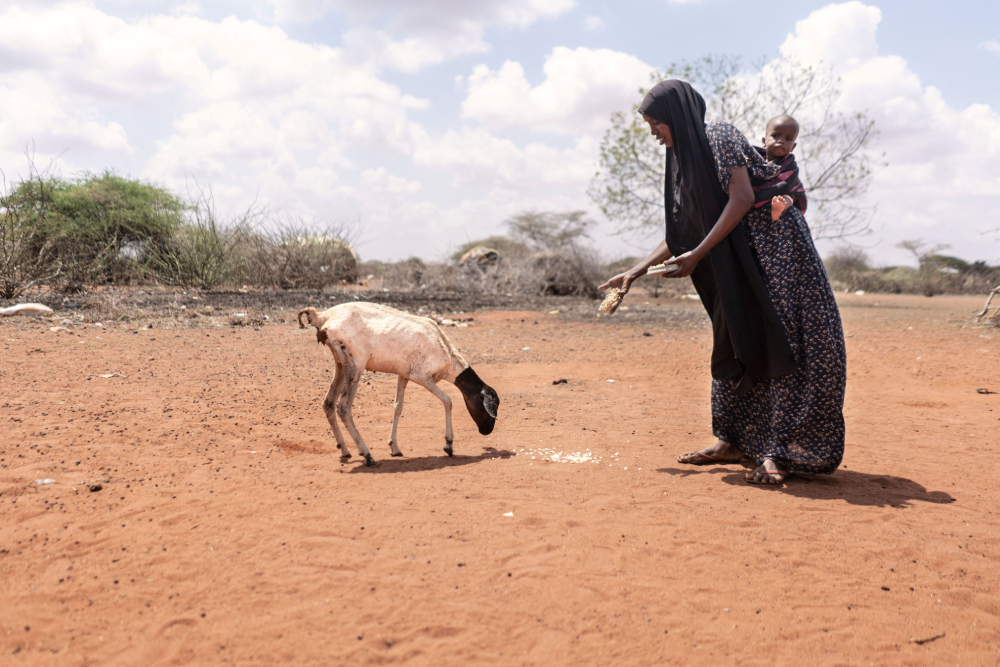
A woman feeds her goat outside her house amid the lack of grazing lands in the drought-stricken town of Wajir, Kenya, Dec. 2, 2021. (CNS/World Food Program handout via Reuters)
Across Africa, the church is responding both spiritually and practically. Parishes host water conservation workshops, convents distribute seeds and sisters teach children to plant trees.
"The church must be present, prophetic, and practical," said Daquin, who also represents NGO VIVAT International at UN Environment Programme sessions. "Walk beside the poor, amplify their stories, and turn our parishes into hubs of ecological resilience."
For families like Lokito's, these small-scale efforts are a lifeline. "We don't talk about climate change in big words," she said, glancing at the dry bucket. "We just know the rains no longer come when they should."
Africa's frontline communities are living the reality of climate change that three decades of COPs have failed to contain.
In Ghana, rising sea levels are swallowing entire fishing villages along the coast. In places like Ada Foah, Catholic parishes and local residents have built makeshift sandbag barriers to slow the encroaching tides, a fragile defense against an ocean that claims new ground every year.
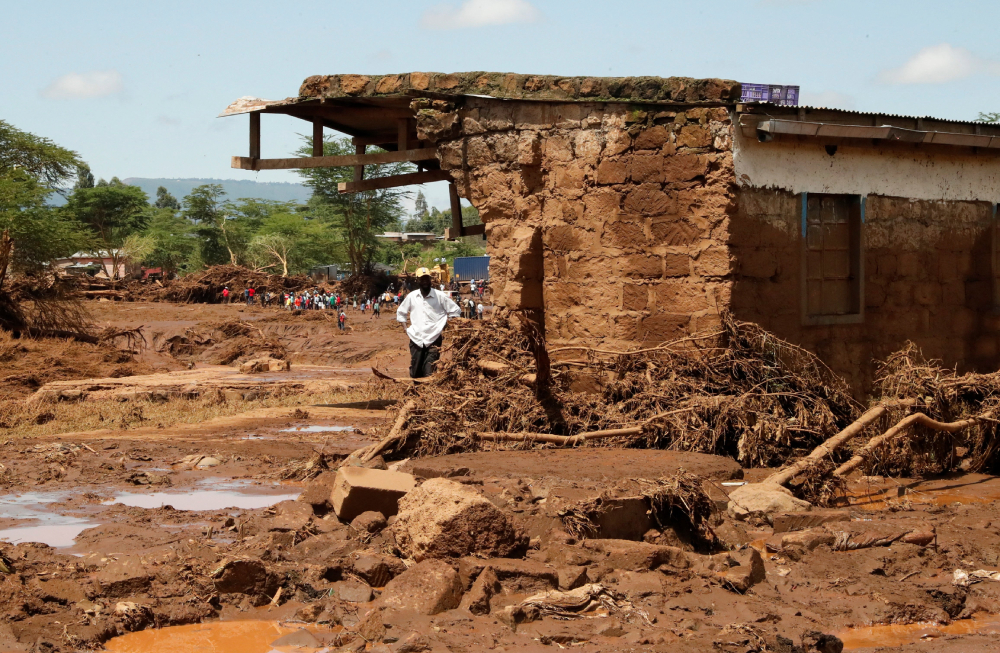
A man looks at the ruins of a house in the Kamuchiri village of Mai Mahiu in central Kenya's Nakuru County April 29, 2024, after heavy flash floods wiped out several homes when a dam burst, following heavy rains. (OSV News/Reuters/Thomas Mukoya)
In Mozambique, Catholic leaders have become first responders when disasters strike. Their parishes and convents now double as emergency shelters, offering refuge to families displaced by repeated cyclones and floods. Once, they prepared for one major storm a year; now, extreme weather arrives in relentless succession, leaving little time for recovery.
And in Kenya, Lokito waits for the rains that no longer come. When they do arrive, they often come in destructive bursts that flood roads and wash away the very crops families prayed for.
A moral reckoning
With COP30 underway, faith leaders say the time for polite appeals is over.
Across Latin America and Africa, the church has built networks that bring frontline voices directly into global discussions, such as the Pan-Amazon Ecclesial Network (REPAM), the Ecclesial Network for the Congo Basin (REMAM) and Caritas Internationalis, which support communities most affected by deforestation, displacement and drought.
"The devastating loss of lives and livelihoods caused by climate-related disasters underscores the urgency of decisive action," said Lisa Sullivan, senior program officer for Integral Ecology at the Maryknoll Office for Global Concerns. "The church is already amplifying the wisdom of those living these realities, making sure that the voices of communities at the frontlines guide the world's response."
Advertisement
Harper said that if world leaders once again fail to act, "faith communities should raise holy hell. We must turn up the moral pressure and rally around a Fossil Fuel Non-Proliferation Treaty — the only ethical path forward. Through prophetic critique and bold public witness, faith movements can expose the moral bankruptcy of delay."
Daquin added that faith communities must turn disappointment into accountability. "If COP30 disappoints, faith communities must shift from gentle encouragement to structured accountability — naming shortfalls, tracking promises, and organizing coalitions for sustained pressure. Faith must lead where politics hesitates."
As night settles on Turkana, Lokito prepares a small meal for her children before joining others in prayer. The world's leaders will soon meet in Brazil to talk about the crisis shaping her life, but she is too busy surviving its consequences. For her, hope is not in declarations, but in the next drop of rain.
"When the rain comes, we will plant again," she said, looking out at the empty fields. "Until then, we wait."




